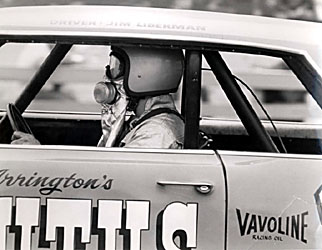|
The full-time truck driver defeated John "the Zookeeper" Mulligan in
the Ward & Wayre "Longshot," Frank Cannon in Bill Crossley's dragster,
Nick Marshall in the Marshall & Vermilya dragster, Connie Kalitta, and
in the final, the redoubtable James Warren in the Warren & Crowe entry.
Haase had qualified with a decent enough 7.77, but he trailed the big
players by two tenths and didn't figure to last long in eliminations.
In qualifying, Tom "the Mongoose" McEwen set Low E.T. with a 7.52 and
with it ran the first 210-mph pass on NHRA record run clocks, a 211.76.
This run came only a month after the late Denny Milani had shattered
the 210-mph barrier at Sacramento Raceway with a backed-up 211.26.
Not only did McEwen hit 211, but so did Prudhomme in Roland Leong's
"Hawaiian" with a first-round 7.54/211.76. Haase never ran quicker than
his final-round 7.70, but five other cars had run 7.5s and another half-dozen
had clicked with 7.6s.
The other big deal of the event was Jack Chrisman's 1965 blown and
injected, nitro-burning Mercury Comet Funny Car. He was restricted to
exhibition singles, but that took none of the luster off his performances.
As with his first (and first for the sport) blown nitro burner, Chrisman
boiled the hides at the start with the car, finally hooking up and charging
at half track. He ran best e.t.s of 9.72 and 9.79 with a best speed
of 163.04 mph.
The following year, it was McEwen's turn to visit the Top Fuel winner's
circle, this time with Lou Baney's Brand Motors Ford City Spl. For "the
Mongoose," this was his first really big Top Fuel win. He'd been successful
in match races, but here he knocked off a top-rate 32-car field, not
the least of which was his final-round foe Ron Rivero.
McEwen knocked off 17-year-old future Top Gas great Billy Scott aboard
the Scotty's Muffler entry in round one with a shut-off 7.51/175.43,
and then followed with a 7.43/195.64 win over Rick Stewart in Bill Crossley's
dragster; a 7.52/192.70 win over Hank Clark in the Beaver Bros. dragster;
a 7.67/191.08 nod over John Edmunds in Tony Waters' dragster; and in
the final, a peculiar 7.39/202.70 nod over Ron Rivero in the Weekly-Rivero-Fox-Holding/"Frantic
Four" dragster.
Rivero never left the starting line, claiming his "Frantic Four" dragster
was never staged properly before the green light came on. When McEwen
staged, his light worked fine and he sped to the win. Later, Rivero's
crew came back and tried to figure out what went wrong, but to no avail.
The win was McEwen's.
That was too bad for Rivero because he clearly was running the strongest
car in the place. In round one, the then very formidable Nick Marshall
ran a very good 7.58/212.76 only to be trainlengthed by Rivero's 7.33/221.66.
The 221.66 was backed up by an earlier 217.90-mph speed in qualifying,
making the Pomona driver the first driver to back up a 220-mph speed.
In addition, John Mulligan qualified No. 1 with the Adams & Wayre dragster
with a brilliant 7.24/219.50, a track record and the best elapsed time
of the year.
 |
Jim Liberman driving "Brutus"
in 1966.
(Tim Marshall photo) |
Chrisman showed in Funny Car with a 1966 Comet flip-top roadster and
ran away with the title. In the final, he clobbered a 20-year-old "Jungle
Jim" Liberman (photo by Tim Marshall) in Lew Arrington's wild Chrysler-powered
"Brutus" GTO with a low e.t. 8.71/179.28. Earlier, he'd run the best
speed in Funny Car history with a 184.42-mph charge.

Copyright 1999-2001,
Drag Racing Online and
Racing Net Source
|